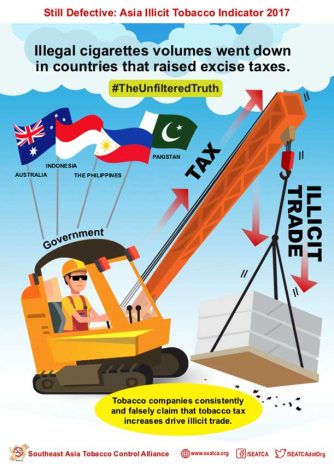Tobacco Industry Factoid on Illicit Trade Leading Governments Astray

BANGKOK, Thailand, Jul 21 (IPS) - A factoid is unreliable information repeated so often that it becomes accepted as fact. One such factoid repeatedly echoed across the globe by the tobacco industry is that tobacco tax increases worsen cigarette smuggling.
For governments facing challenges to curb smuggling, particularly in the global South, this factoid has scared political leaders from effectively using taxes as a public health tool.
Tax increases used as part of comprehensive tobacco control have been shown to successfully reduce smoking in many countries, including Australia, Thailand, Philippines and South Africa.
In 2016, Australia implemented annual increases in tobacco excise of 12.5% a year till 2020, raising the cost of a pack of cigarettes to about AUD 40. Australia's current smoking prevalence at less than 13 percent is one of the lowest in the world.
According to the World Bank, taxes and prices have only a limited impact on the illicit cigarette market. In fact, another study found that lower income countries, where cigarette taxes and prices are low, have higher levels of cigarette smuggling than higher income countries with high taxes and prices.
The tobacco industry supports small tax increases but opposes large increases that effectively reduce the affordability of their products. Asia being a major market for tobacco companies, it is tactical for them to defeat or undermine effective tobacco tax increases in Asian countries.
Tobacco industry-commissioned studies routinely link high levels of smuggling to tax increases. One such report is the Asia Illicit Tobacco Indicator 2017 report sponsored by Philip Morris International (PMI) and done by Oxford Economics (OE), a U.K. based think tank.
The study, for example, shows Malaysia having among the highest tobacco smuggling in the world at 56%, followed by Pakistan at 42%. However, alternate studies on illicit trade in both countries show significantly lower levels at 27% and 16% respectively.
Many governments have been fed data from this PMI-funded report by OE, which has been described as severely flawed in a critique recently released by the Southeast Asia Tobacco Control Alliance (SEATCA). The critique uncovers the report's poor data quality, identifies multiple deficiencies in the methodology, and exposes the deceptive presentation of study results, underlining the fact that industry-commissioned reports do not provide scientifically sound information to policy makers and are biased to the interests of the tobacco industry.
Previous critiques, More myth than fact and Failed, already identified similar flaws of industry-funded OE reports on illicit trade in 2012 and 2013.
Using think tanks to conduct industry-friendly research is a known tactic of the tobacco industry. These research reports are launched using high profile spokespersons to promote the report findings.
This was clearly seen in Malaysia when the report was referred to by a criminologist and used as a launching pad for tobacco company activities to counter smuggling. The industry continues to use this tactic because of its impact on governments that are vulnerable to economic downturn and lack resources to curb illicit trade.
The illicit trade factoid is a key "go-to" narrative used repeatedly by the tobacco industry to undermine tobacco control efforts across countries in Asia and globally, whether tax increases, standardized packaging, large pictorial health warnings, advertising bans, public smoking bans, or bans/regulations on new and emerging tobacco products, such as e-cigarettes and heated tobacco products.
During the current global economic slowdown, despite a recognized link between smoking and COVID-19, tobacco companies continue to manufacture and profit from tobacco products.
Governments must therefore use this COVID-19 pandemic as an opportunity to level up their tobacco control policies and programs and redouble their efforts to protect public health policies from tobacco industry influence, as there is an irreconcilable conflict of interest between public health and the commercial and vested interests of the tobacco industry.
Governments must recognize that tobacco is a harmful and unessential product and should reject partnerships with the tobacco industry and fully scrutinize any information provided by tobacco companies. Governments must seek to eliminate the problem of illicit tobacco trade, but they shouldn't be intimidated by the tobacco industry's illicit trade factoid.
*SEATCA is a multi-sectoral non-governmental alliance promoting health and saving lives by assisting ASEAN countries to accelerate and effectively implement the tobacco control measures contained in the WHO FCTC. Acknowledged by governments, academic institutions, and civil society for its advancement of tobacco control in Southeast Asia, the WHO bestowed on SEATCA the World No Tobacco Day Award in 2004 and the WHO Director-General's Special Recognition Award in 2014.
The Economics of Tobacco Control Project (ETCP) is housed in the Research Unit on the Economics of Excisable Products (REEP) at UCT's School of Economics. The ETCP aims to expand current research efforts in the economics of tobacco control and to enhance the knowledge of economic and tax issues among tobacco control advocates and policymakers to strengthen support for tobacco tax and price increases in sub-Saharan Africa. These expanded efforts will increase the quantity and quality of research on the economics of tobacco control in the region, facilitate the growth of a new generation of tobacco control economics researchers and contribute to the creation of a centre of research excellence in sub-Saharan Africa.
© Inter Press Service (2020) — All Rights Reserved. Original source: Inter Press Service

